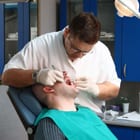 When plaque and bacteria attack the protective layer of tooth enamel that surrounds the tooth, they begin to erode it. This causes cavities, that eventually leads to tooth decay exposing the sensitive inner parts of the teeth, including the dental nerve, to infection. If an infection occurs in the tooth, the body will respond by producing an excess of white blood cells to combat the infection.
When plaque and bacteria attack the protective layer of tooth enamel that surrounds the tooth, they begin to erode it. This causes cavities, that eventually leads to tooth decay exposing the sensitive inner parts of the teeth, including the dental nerve, to infection. If an infection occurs in the tooth, the body will respond by producing an excess of white blood cells to combat the infection.
These white blood cells will bombard the infected area eventually leading to a build up of material commonly known as pus. This build up happens in the tooth or the area of gum immediately surrounding it. This is known as a tooth abscess and can be the source of great pain and discomfort. The abscess is also likely to be very sensitive to hot and cold food and can make everyday activities such as eating and even talking very unpleasant.
Furthermore, it is possible for the abscess to rupture expelling the nasty material into the mouth and causing the infection to spread to other parts of the mouth, and even into the blood stream. Recent evidence has also shown that infections originating in the mouth can be an underlying cause of heart disease and even fatal heart attacks.
Treatment from a City of Leeds dentist at an early stage of the infection will prevent the formation of an abscess and remove any trace of the infection for the tooth. More preferable still is that a regular six month check up appointment with a dentist will catch the infection before it has had a chance to become serious and can easily be treated.
If you suspect you may have a tooth abscess or are experiencing any pain in your teeth that could be the beginnings of an infection, make an appointment immediately to see your dentist and you could prevent a more serious infection taking hold in your mouth and causing further problems.





 Tooth decay is the process by which the enamel and dentine are eroded away by bacteria and plaque acid that accumulates in the mouth. Tooth decay can be very painful and can eventually lead to infection and tooth loss. However, tooth decay is completely preventable by the adequate and regular brushing and flossing of teeth.
Tooth decay is the process by which the enamel and dentine are eroded away by bacteria and plaque acid that accumulates in the mouth. Tooth decay can be very painful and can eventually lead to infection and tooth loss. However, tooth decay is completely preventable by the adequate and regular brushing and flossing of teeth.

